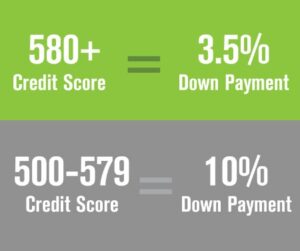Get Pre-Approved Today!
Check Rates with Multiple Lenders and Get Pre-Approved in Minutes!


A Complete Guide to FHA Home Loans in 2025

If you’re exploring mortgage options, you’ve probably come across FHA loans.
These government-backed loans are a great choice for first-time homebuyers and those with lower credit scores or smaller down payments. But how do they work, and are they right for you?
This guide will break down FHA loan requirements, benefits, costs, and how they compare to conventional loans. By the end, you’ll have a clear understanding of what to expect when applying for an FHA loan in 2025.
What is an FHA Loan?
FHA stands for the Federal Housing Administration, a government agency established in 1934 under the U.S. Department of Housing and Urban Development (HUD).
The FHA doesn’t issue loans directly; instead, it insures loans provided by approved lenders. This insurance protects the lender in case of borrower default, allowing lenders to offer loans with lower requirements and increased accessibility.
Key Features of FHA Loans:
- Lower credit score requirements
- Low down payment options
- Flexible debt-to-income ratios
- Mortgage insurance premium (MIP) required
FHA loans are designed to help individuals with lower credit scores or those unable to make a large down payment achieve homeownership. FHA loans have been a popular choice for first-time homebuyers and those with limited financial resources.
FHA Loan Requirements

To qualify for an FHA loan, you must meet the following criteria:
- Credit Score:
- 500-579: Requires a 10% down payment
- 580+: Requires a 3.5% down payment
- Debt-to-Income Ratio (DTI): Maximum 43% (may be up to 50% with lender approval)
- Employment History: Two years of stable employment with consistent income
- Bankruptcy: Two-year waiting period after bankruptcy discharge
- Documentation: Proof of income, tax returns, W-2s, and recent pay stubs
- Occupancy Requirement: FHA loans are only for primary residences
- Mortgage Insurance: Required for the life of the loan if the down payment is less than 10%
For more in-depth details, you can review the HUD Handbook HUD 4000.1.
Credit Score Requirements
Your credit score will play a significant role in determining your eligibility for an FHA loan. Here’s how it breaks down:
- 580+ Credit Score: You only need a 3.5% down payment.
- 500-579 Credit Score: A higher 10% down payment is required. However, it’s important to note that many lenders are hesitant to approve FHA loans for those with scores under 580.
If your score falls below 580, it’s worth working on improving your credit before applying. For tips on boosting your score, read our guide to improving your credit in 30 days.
Basic FHA Loan Qualifications
| Requirement | FHA Loan Criteria |
|---|---|
| Minimum Credit Score | 580+ (3.5% down) or 500-579 (10% down) |
| Debt-to-Income (DTI) Ratio | 43% max (higher possible with compensating factors) |
| Primary Residence Requirement | Must be owner-occupied |
| Employment History | Two years of stable employment |
| Loan Limits (2025) | $524,225 (low-cost areas) – $1,209,750 (high-cost areas) |
FHA Loan Costs & Fees
FHA Loan Costs & Fees Breakdown
| Fee Type | Cost Estimate | Description |
|---|---|---|
| Upfront Mortgage Insurance Premium (UFMIP) | 1.75% of loan amount | A one-time fee required on all FHA loans. It can be rolled into the loan balance. |
| Annual Mortgage Insurance Premium (MIP) | 0.15% – 0.75% of loan amount per year | Paid monthly as part of the mortgage payment. The exact rate depends on loan term and LTV. |
| Down Payment | 3.5% (credit score 580+) or 10% (credit score 500-579) | The minimum required down payment based on credit score. |
| Loan Origination Fee | 0% – 1% of loan amount | A fee charged by the lender for processing the loan. Some lenders waive this fee. |
| Appraisal Fee | $300 – $700 | An FHA-approved appraiser must assess the home’s value and condition. |
| Title Insurance | $500 – $2,000 | Protects against legal issues with property ownership. Required by lenders. |
| Credit Report Fee | $30 – $50 | Charged by the lender to pull credit reports for qualification. |
| Home Inspection (Optional but Recommended) | $300 – $600 | Ensures the home is in good condition; separate from the FHA appraisal. |
| Recording Fees | $50 – $300 | Paid to the local government to officially record the mortgage and property deed. |
| Escrow Prepaids (Taxes & Insurance) | Varies by location | Borrowers typically pay 6-12 months’ worth of property taxes and homeowners insurance upfront. |
| Discount Points (Optional) | 1% of loan amount per point | Can be paid to lower the mortgage interest rate. |
FHA Mortgage Insurance (MIP)
FHA loans require mortgage insurance to protect lenders in case of default.
| Mortgage Insurance | Cost |
|---|---|
| Upfront MIP (UFMIP) | 1.75% of loan amount (can be financed into the loan) |
| Annual MIP | 0.15% – 0.75% (paid monthly) |
💡 Can you remove FHA mortgage insurance?
Only if you refinance into a conventional loan with 20% equity.
FHA Loan Benefits for First-Time Homebuyers
Approximately 46% of first-time homebuyers used FHA loans in recent years due to their flexible qualification requirements. Here’s why FHA loans are a great choice for first-time buyers:
- Low Down Payment: Just 3.5% down with a 580 credit score or higher.
- Low Credit Requirements: Borrowers with less-than-perfect credit can still qualify.
- Down Payment Assistance: Many FHA borrowers can combine their loan with down payment assistance programs.
Down Payment Assistance Programs
If you’re a first-time homebuyer, there are state and local programs designed to help with your down payment. You can find more information on available state programs through the HUD website. For local programs, check with your city or county government.
1. State Housing Finance Agencies (HFAs)
Many state HFAs offer programs to help first-time and low-to-moderate-income borrowers meet FHA down payment requirements. These programs often provide grants or low-interest second mortgages to cover down payments and closing costs.
- Available in most states for FHA borrowers.
- Typically geared toward first-time or low-income homebuyers.
- Grants don’t require repayment; second mortgages often have deferred payments.
2. FHA Chenoa Fund
The Chenoa Fund is a national program that provides down payment assistance for FHA borrowers. It offers forgivable or repayable loans, depending on the borrower’s circumstances, to help bridge the gap for homebuyers.
- Offers forgivable loans after 36 months of on-time payments.
- Covers up to 3.5% of the purchase price.
- Designed for borrowers with at least a 620 credit score.
3. Good Neighbor Next Door Program
The Good Neighbor Next Door Program provides significant discounts for law enforcement officers, teachers, firefighters, and emergency medical technicians purchasing homes in revitalized areas.
- Offers a 50% discount on eligible home prices.
- Requires living in the home for at least 36 months.
- Includes FHA loan compatibility to cover remaining costs.
4. National Homebuyers Fund (NHF)
The NHF program offers down payment assistance in the form of grants or loans to FHA borrowers. The program is available through participating lenders and does not require repayment in certain cases.
- Covers up to 5% of the loan amount for down payment and closing costs.
- Available to first-time and repeat homebuyers.
- No income limits for eligibility in some areas.
Each program has specific eligibility criteria, so check with your lender or local housing agency to find the best fit for your situation.
FHA Loan Process: How to Apply
If you’re considering an FHA loan, here’s a step-by-step guide to the application process:
Check Your Credit Score & Finances
- Make sure you meet FHA credit score requirements.
- Calculate DTI to ensure eligibility.
Find an FHA-Approved Lender
- Not all lenders offer FHA loans, so choose a government-approved lender.
Get Preapproved
- Submit income verification, employment history, and financial documents.
Find a Home & Make an Offer
- Ensure the property meets FHA standards (must be a primary residence).
Complete the FHA Loan Appraisal
- The FHA requires an appraisal to confirm the home’s value and safety.
Close on the Home
- Pay closing costs, sign paperwork, and receive your keys!
Common FHA Loan Myths (Debunked!)
- “FHA loans are only for first-time buyers.”
❌ False! Anyone who meets the criteria can use an FHA loan. - “You can’t use FHA loans for fixer-uppers.”
❌ False! FHA 203(k) loans allow you to finance repairs & renovations. - “FHA loans take longer to close.”
❌ Not always! Many FHA loans close within 30-45 days, just like conventional loans.
FHA Loans for Veterans: An Alternative to VA Loans
While VA loans are a top choice for many veterans, FHA loans can serve as an alternative when VA loan benefits are unavailable or don’t meet specific needs. Backed by the Federal Housing Administration, FHA loans are accessible to all borrowers, including veterans, and can be a viable option for homebuyers with unique financial circumstances.
Key Benefits of FHA Loans for Veterans:
- Lower Credit Requirements: FHA loans typically require a minimum credit score of 580, making them accessible for veterans with less-than-perfect credit.
- Smaller Down Payment: With a down payment as low as 3.5%, FHA loans provide a path to homeownership with less upfront cash compared to conventional loans.
- Flexible Eligibility: Unlike VA loans, FHA loans don’t require military service eligibility, which can benefit veterans who don’t qualify for VA benefits.
- Assumable Loans: FHA loans can be transferred to a new buyer, making them appealing for resale in the future.
While FHA loans require mortgage insurance premiums (MIP), they remain a strong option for veterans who may not meet VA loan requirements or are exploring other financing options. Always compare FHA loans with VA loans and consult a lender to determine the best fit for your needs.
FHA Loans for Buyers with Bad Credit
FHA loans are a popular option for buyers with lower credit scores. However, if your score is below 580, it’s a good idea to focus on improving your credit before applying. A higher score will help you secure better terms, including a lower interest rate, reducing your monthly payments. You can review our credit improvement guide for actionable steps to improve your score quickly.
View our article on getting an FHA Loan with Bad Credit
FHA Loans for Low-Income Buyers
FHA loans are an excellent choice for low- to moderate-income buyers, as they allow for more flexibility in debt-to-income ratios. While most lenders prefer a DTI of 43% or lower, some FHA lenders can approve borrowers with a DTI as high as 50%.
Who Should Consider an FHA Loan?
- Individuals with lower credit scores
- Buyers with limited down payment funds
- First-time homebuyers
- Those with high debt-to-income ratios
FHA Down Payment Gifts
One of the most significant advantages of FHA loans is that your entire down payment can come from a gift. Family members, employers, or charitable organizations can provide down payment gifts, as long as they meet FHA guidelines. You’ll need to fill out a gift letter that specifies the gift is not a loan.
FHA Closing Costs
Closing costs for FHA loans, like other mortgages, are fees and expenses paid at the time of finalizing the loan. These typically range from 2% to 5% of the loan amount, depending on the lender, property location, and loan specifics. FHA borrowers may encounter the following costs:
- Origination Fees: Charged by the lender to process the loan application, typically around 1% of the loan amount.
- Appraisal Fees: Covers the cost of a professional evaluation to ensure the home meets FHA standards and determine its value.
- Title Insurance: Protects both the borrower and the lender against disputes over property ownership.
- Recording Fees: Fees paid to the local government to officially record the property sale and loan documents.
Options for Managing Closing Costs
Borrowers have several options to manage or reduce these costs:
- Negotiate Seller Contributions: FHA guidelines allow sellers to contribute up to 6% of the home’s sale price toward closing costs.
- Roll Costs Into the Loan: Some lenders allow borrowers to finance their closing costs by adding them to the loan amount.
- Shop Around: Compare fees from multiple FHA-approved lenders to ensure you’re getting the best deal.
FHA Loan Limits for 2025
Starting January 1, 2025, new loan limits for FHA forward mortgages will take effect, impacting 3,151 counties across the U.S. These updated limits reflect rising home prices, ensuring borrowers have better access to financing.
The FHA loan limits vary based on property size and location, with higher ceilings in high-cost areas and special exceptions for Alaska, Hawaii, Guam, and the U.S. Virgin Islands due to higher construction costs.
2025 FHA Loan Limits by Property Size and Location
| Property Size | Low-Cost Area “Floor” | High-Cost Area “Ceiling” | Special Exception Areas (AK, HI, Guam, USVI) |
|---|---|---|---|
| One Unit | $524,225 | $1,209,750 | $1,814,625 |
| Two Units | $671,200 | $1,548,975 | $2,323,450 |
| Three Units | $811,275 | $1,872,225 | $2,808,325 |
| Four Units | $1,008,300 | $2,326,875 | $3,490,300 |
To find the exact FHA loan limit in your county, check the HUD Loan Limits page.
FHA 203(k) Loans
An FHA 203(k) loan is a unique financing option for buyers looking to purchase a home that needs repairs or updates. Instead of requiring separate loans for the home purchase and renovations, the FHA 203(k) combines both into a single mortgage. This loan can be an excellent choice for buyers who see the potential in fixer-upper properties but lack the funds for immediate repairs.
Benefits of FHA 203(k) Loans
- Combines Purchase and Renovation Costs: Streamlines financing by bundling the home’s purchase price and renovation costs into one loan.
- Flexible Eligibility: Available for borrowers with lower credit scores and smaller down payments, like other FHA loans.
- Increase Home Value: Renovations can significantly boost the property’s value, offering long-term financial benefits.
- Wide Range of Eligible Repairs: From structural improvements to cosmetic updates, many types of renovations qualify.
Types of FHA 203(k) Loans
- Standard FHA 203(k): Ideal for major renovations, such as structural changes, room additions, or significant repairs.
- Limited FHA 203(k): Designed for smaller projects, allowing up to $35,000 for non-structural repairs and updates.
Eligible Repairs for FHA 203(k)
- Structural repairs, such as foundation or roof work
- Upgrading plumbing, electrical, or HVAC systems
- Energy-efficient improvements like solar panels or better insulation
- Cosmetic upgrades like new flooring or painting
- Accessibility improvements for disabled individuals
FHA vs. Conventional Loans: What’s the Difference?
Here’s how FHA loans compare to conventional loans:
| Feature | FHA Loan | Conventional Loan |
|---|---|---|
| Minimum Credit Score | 580+ (3.5% down) | 620+ (5%-20% down) |
| Down Payment | 3.5% (580+ score) | 5%-20% |
| Mortgage Insurance | Required for life | Can be canceled |
| Loan Limits | Lower than conventional | Higher limits possible |
| Debt-to-Income Ratio | More flexible | Stricter requirements |
FHA loans are a great option for those with lower credit scores or smaller down payments, but they come with mortgage insurance costs. On the other hand, conventional loans may offer better terms for borrowers with higher credit scores and larger down payments.
The Bottom Line
Frequently Asked Questions (FAQs)
Can I use an FHA loan to buy a second home?
FHA loans are primarily intended for primary residences. However, in certain circumstances, such as needing to relocate for work or if your family has outgrown your current home, you may be able to secure a second FHA loan.
What types of properties can I purchase with an FHA loan?
FHA loans can be used to purchase single-family homes, multi-family homes (up to 4 units), condos approved by the FHA, and certain manufactured or mobile homes that meet FHA standards.
Can FHA loans be used for renovations?
Yes, through the FHA 203(k) loan, you can finance the purchase of a home and include the cost of renovations. This loan allows you to borrow money to buy and improve a home with a single mortgage.
Do FHA loans have income limits?
There are no specific income limits for FHA loans. However, lenders will evaluate your debt-to-income ratio to ensure you can afford the loan.
Can I refinance my FHA loan?
Yes, FHA offers a streamline refinance option, which allows you to refinance your FHA loan to a lower interest rate without a new appraisal or extensive credit checks.
Are there any penalties for paying off an FHA loan early?
No, FHA loans do not have prepayment penalties. You can pay off your loan early without incurring any additional fees.
How much can I borrow with an FHA loan?
The loan limits vary based on the area where you’re buying a home. For 2024, limits range from $472,030 in low-cost areas to $1,089,300 in high-cost areas. You can check the specific loan limits in your area by visiting the HUD Loan Limits page.
What are the upfront costs for an FHA loan?
In addition to your down payment, FHA loans require an upfront mortgage insurance premium (UFMIP) of 1.75% of the loan amount. This can either be paid at closing or rolled into your loan amount.
Can I combine an FHA loan with other financial assistance programs?
Yes, many first-time homebuyers using FHA loans can also qualify for down payment assistance programs or state and local grants to further reduce the upfront costs.






